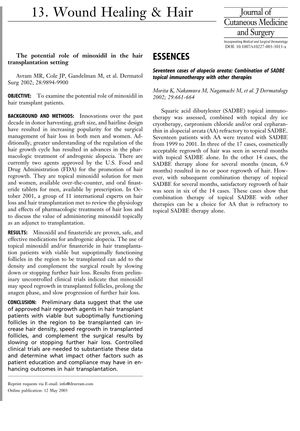Wound Healing and Hair: The Role of Minoxidil in Hair Transplant Patients
July 2003
in “
Journal of Cutaneous Medicine and Surgery
”

TLDR Minoxidil may improve hair transplants and combining treatments could help alopecia areata.
In a study from 2002, researchers explored the potential role of minoxidil in hair transplant patients. Minoxidil and finasteride were recognized as safe and effective treatments for androgenic alopecia. Preliminary uncontrolled clinical trials indicated that minoxidil might enhance hair transplant outcomes by speeding up regrowth in transplanted follicles, prolonging the anagen phase, and slowing further hair loss. The study concluded that using minoxidil in hair transplant patients with viable but suboptimally functioning follicles could increase hair density and improve surgical results. However, controlled clinical trials were recommended to confirm these findings and assess the impact of patient education and compliance. Additionally, a separate study on 17 patients with alopecia areata (AA) from 1999 to 2001 found that combination therapy using squaric acid dibutylester (SADBE) with other treatments could be effective for AA that did not respond to SADBE alone.





